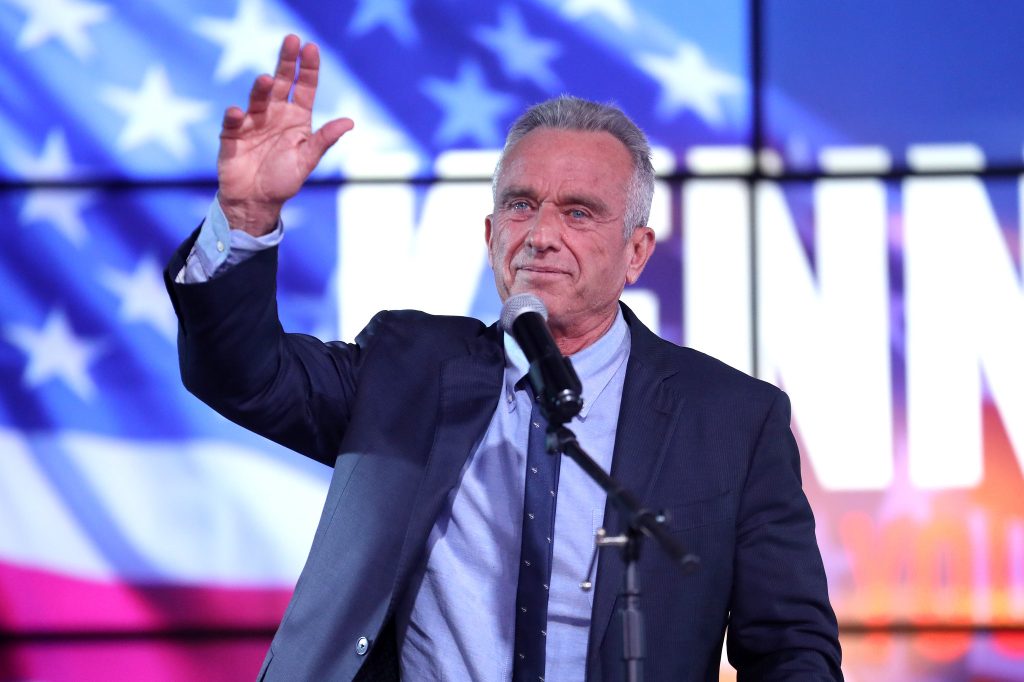State Sues Federal HHS, Sec. Kennedy Over Public Health Cuts
Wisconsin joins nearly two-dozen states suing over cuts in public health funding.

Robert F. Kennedy, Jr. speaking with supporters at a campaign rally at Legends Event Center in Phoenix, Arizona. Photo by Gage Skidmore. (CC BY-SA 2.0)
The state of Wisconsin has joined nearly two dozen states in a lawsuit alleging the U.S. Department of Health and Human Services (HHS) and Secretary Robert F. Kennedy, Jr. violated federal law when they sought to claw back approximately $11 billion in public health grants.
Last week, on March 25, the Wisconsin Department of Health Services received notice from HHS that $210 million in grants awarded to the state were being terminated. The sole reason, according to DHS and the states suing the federal government, is that the grants were released in response to the COVID-19 pandemic, and now the pandemic is over.
“Now that the pandemic is over, the grants and cooperative agreements are no longer necessary as their limited purpose has run out,” HHS told the Wisconsin Department of Health Services last week.
The grants were used to bolster public health infrastructure and local authorities’ pandemic response. As the pandemic waned, agencies developed plans to use the funding to strengthen and modernize public health systems and technology, for EMS systems and to support mental health and addiction treatment across the state.
“These cuts will hurt Wisconsin’s ability to combat fentanyl and the opioid epidemic, help folks in mental health crisis, and respond to future public health emergencies,” Gov. Tony Evers said.
Attorney General Josh Kaul, who joined the suit on behalf of the state, said the funding for the grants was appropriated by Congress and that many of the grant programs were also created by Congress. Kaul charges that Kennedy does not have the legal authority to terminate the grants, according to a statement from his office Tuesday morning. The federal lawsuit claims HHS and Kennedy engaged in “arbitrary and capricious” violations of the Administrative Procedure Act.
In a sworn declaration, Wisconsin Department of Health Services Debra Standridge laid out the funding cuts’ impact, which would hit state public health laboratory capacity and workers, local public health crisis response, community health worker training, substance abuse programs for pregnant women and child immunization programs.
Rescinding the funding for epidemiology and laboratory capacity would disrupt projects streamlining or upgrading disease reporting systems, including the Wisconsin Cancer Reporting System; cut funding for new laboratory instruments; and reduce the testing capacity for multiple kinds of tests, including the respiratory pathogen panel that detects more than 20 of the most common respiratory diseases.
The laboratory cuts would also lead to layoffs for staff supporting a disease reporting system used by local health departments to investigate waterborne diseases, illnesses from tick bites and other infectious diseases, officials said.
As mental health challenges and substance abuse spiked during the pandemic, public health funding from that time was directed to efforts aimed at treating and responding to both. Grants targeted for cuts included the Substance Abuse Prevention and Treatment block grant program, which was providing funding directly to counties in Wisconsin to tackle the issue.
“I support the State of Wisconsin’s decision to join this lawsuit,” Milwaukee County Executive David Crowley said. “These funding cuts will have devastating effects on the health of our community and the lives of residents who depend on these services.”
State funding was also being directed to programs expanding access to harm reduction supplies (narcan, fentanyl test strips), women’s residential treatment facilities, peer support programs and medically assisted treatment for substance addiction.
The effects of the decision by Kennedy and HHS are having an immediate impact on treatment services in Wisconsin that relied on some of the funding. Respite-care facilities, which provide short-term residential care and reduce the need for crisis response, have reduced their availability from seven nights a week to four, or, in one case, closed entirely. In the latter case, 12 staff lost their jobs and four individuals had to abruptly end their stay at the facility.
The lawsuit Wisconsin joined is seeking a temporary restraining order on HHS grant terminations and asking the court to prevent the agency from reinstating the terminations in the future.
Legislation Link - Urban Milwaukee members see direct links to legislation mentioned in this article. Join today
If you think stories like this are important, become a member of Urban Milwaukee and help support real, independent journalism. Plus you get some cool added benefits.
Political Contributions Tracker
Displaying political contributions between people mentioned in this story. Learn more.





















